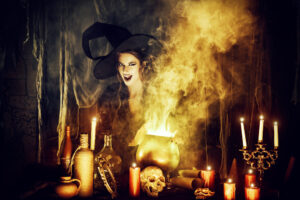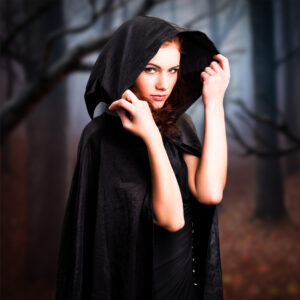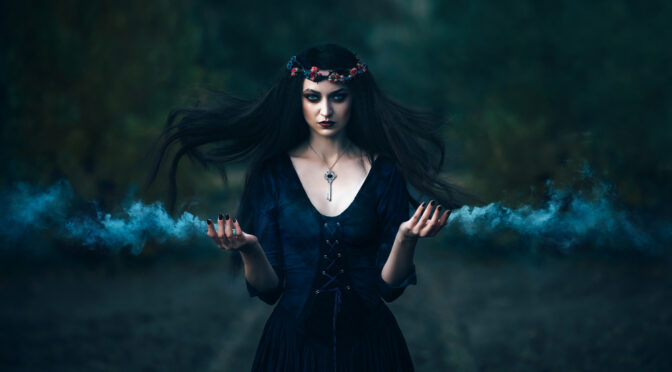It’s amazing how many misconstrued assumptions about something can turn into “fact” when enough people repeat them. Witchcraft and Wicca are looked at with questionable, and oftentimes worrisome glances due to the amount of misinformation floating around out there.
As someone who practiced Wicca for over a decade, I would like to set the record straight about a few of the more widely-spread inaccurate misconceptions. Keep in mind, as with any other religion, there are bound to be some aspects left up to debate.
First, let’s take a look at what Wicca and witchcraft really are before we go on to clarify what they aren’t.
Wicca and witchcraft have much in common, but they are not exactly the same. Someone can be a witch, without being a Wiccan, just like someone can be a Christian, without being a Protestant. Wicca has been a recognized religion since the 1950’s, and is based on ancient witchcraft traditions and rituals.
Some of these traditions stem from Celtic origins, but that doesn’t mean Wicca is necessarily connected to the Celts or the Druids, though there are specific Celtic-Wicca denominations within the religion.
Despite what some might think about Wicca, it is actually a very peaceful and harmonious way of life. They see the universe as a balanced entity and promote oneness within all living beings and things. In fact, practicing Wicca is what brought to me my spiritual path; there are many similarities between Wicca and spirituality. You’ll see what I mean, as I continue to shine light on the subject at hand.
Wicca can be practiced either in a coven, or on your own. If you’re not one for social gatherings or don’t know where to find a local coven, I recommend Scott Cunningham’s book, “Wicca: A Guide for the Solitary Practitioner” This book contains everything you need to know for living life magically, spiritually, and wholly attuned with nature.
Now that we’ve gone over the very basic definition of Wicca, let’s get down to those misconceptions. All of which, I have heard far too often in life.
“Wiccans worship Satan”
No, Wiccans do not worship Satan. Heck, even Satanists don’t worship Satan. Satan is a Christian belief, and has no part in Wicca, or witchcraft in general.
What Wiccans do worship, is the God, and the Goddess, and several other deities belonging to nature and the divine. They believe in a balanced union of energies- the male energy is the Hunter God, represented by the sun, and the female energy is the Mother Goddess, represented by the full moon. Both are of equal importance, and one is not revered higher than the other.
“Pentagrams are symbols of evil”
Funnily enough, that five-pointed star that people think is evil actually used to be the Christian symbol for Jesus’ five wounds. That was before they changed to the iconic cross we all know so well today. So, no, it’s not evil. Fundamentally, all these symbols existed before our knowledge and labeling of them.

The pentagram represents the 5 elements- earth, water, air, fire, and spirit. The circle outside the star is meant to symbolize the sacred harmony and union of these 5 elements. Again, much like today’s spirituality, universal balance is important.
“Witches are evil”
Much like in every other aspect of life, there are good guys and bad guys, and the bad guys don’t represent the whole group. Yes, there are witches who practice black magic, but that has absolutely nothing to do with the idea of Wicca.
In fact, Wiccans don’t really believe in evil at all- it’s more of a “you can’t have a day without a night” perspective.
There is good, and there is bad, but there is no such thing as pure good or pure evil; everything has a little bit of something else inside itself.
Wiccans believe in “The Law of Three.” What this says is, anything you do will come back to you three-fold. Because of that, and the “Harm None” belief, Wiccans tend not to do anything which would, well…harm someone.
“Witches Curse People”
Actually, most witches are extremely helpful and find curses to be abhorrent things.
While Wiccans do not partake in cursing folks, they do cast spells and make potions involving healing, wisdom, clarity, love, and creativity. Some also use runes and candle-magic as a way to invoke these things.
Wiccans acknowledge the cycles of nature, the lunar phases, and the seasons, and use these as tools to strengthen their personal bonds with magic and spirituality.
“Wicca Isn’t A Real Religion”
As I mentioned before, Wicca is recognized as a religion. The United States even publicly recognizes the observation of Wiccan holidays, varying by state. For example, in New Jersey, Wiccan children are exempt from attending school during the 8 Sabbats (special days coinciding with equinoxes, solstices, and lunar phases).
“Wiccans Sacrifice Animals”
Going along with the “Harm None” philosophy, Wiccans do not slaughter nor sacrifice animals. Not to gods, goddesses, or any other deities.
Wiccans do give offerings, however. They just happen to consist of grain, nuts, fruit, or wine, and not animal carcasses.
“Wiccans Have A Black Spellbook”
Close, but no cigar. It’s not necessarily a spellbook, and they aren’t always black. What most people are inaccurately referring to, is a Book of Shadows. While it may sound dark and sinister to some, it’s a perfectly harmless journal of sorts.
A Book of Shadows can be anything, really. They can be handwritten spells and rituals passed down through generations, or a personal diary of your Wiccan experiences. Some even use them as a dream journal, or to write down sudden bursts of inspiration. A Book of Shadows is whatever you make it.

